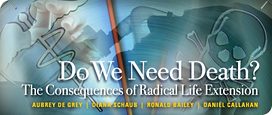Ronald Bailey closes his reaction essay by accusing a group of “well-meaning and intelligent people” (thank you, Ron) of wanting “to stop biomedical research.” So far as I know, no one has called for a ban or moratorium on anti-aging research. I know I did not. There are types of biomedical research that I regard as morally wrong (for instance, research that exploits vulnerable classes of human beings for the benefit of other, usually more privileged, human beings); however, I would not put anti-aging research in that category. If folks want to respond to the Methusaleh Foundation’s passing of the plate and become one of The 300 (whose $25,000 commitment will “beat back not just an army, but the Grim Reaper himself”) that is their business. For my charitable dollars, I would prefer to remedy the malnutrition and childhood diseases that deprive so many of their full “three score and ten.” These are scourges that we have some hope of beating back. For my health-care tax dollars as well, my vote would go to the urgent and the doable. (This is not to say that there is no place for noble and daring government-funded undertakings such as the space program.) Refusing to put my money in the pocket of messianic immortality-seekers does not constitute an attempt “to stop biomedical research.”
What I did attempt was a thought experiment, or the beginnings of one, on the effects of advanced longevity on the shape of our lives and pursuits. This is, of course, pure speculation—based not on “data” but on one’s assessment of the human psyche and social matrix. Bailey’s reference to the “available evidence” of the last century’s real, but exceedingly modest gains in life expectancy—a couple of decades as compared to a millennium—doesn’t strike me as terribly relevant. Works of the literary imagination, including science fiction, probably offer more material for reflection on an ageless future than does any other source.
In my reaction essay, I raised the question of the fate of monogamy (and by implication other life-long commitments) in a millenialists’ world. Bailey ducks the issue by claiming that monogamy has “already begun to fall apart.” Regardless of the divorce rate, the aspiration to find a true and lasting love remains heartfelt today. That fundamental human aspiration could potentially be altered by millennial existence, to the detriment of individual happiness. In his “Conversation” contribution, Bailey is untroubled by the prospect that our descendants might not “breed like us, feed like us, or need like us.” It’s a nice rhyme, but a vulgar idea. At our best, we love and long; we procreate and dine; we don’t breed and feed on the animal model and I hope we won’t in future. Civilization depends on the uniqueness of human sexuality—and much of that uniqueness may derive from our awareness of and experience of mortality.
Bailey refers to using “new technology to help us and our families to flourish.” However, in his first posting, he describes the “happy side effect” of a “lack of interest in progeny.” He implies that there will be more for us (the lucky Olympians), since we won’t be troubled by the overpopulation that could result from wave after wave of near-immortal generations. (By the way, my point about the inverse relationship between longevity and fertility—observable in age-retardation research with animals—was not about interest in having offspring but the physiological ability to do so.) If hyper-longevity impairs the bond between generations that would be a loss for both individuals and society. I find it paradoxical that the supposedly gloomy and cramped “pro-mortalists” are the ones who welcome new generations and the vibrancy and hopes they bring, while the “pro-longevists” would sentence mankind to live under the reign of the self-preoccupied baby-boomers forever.

